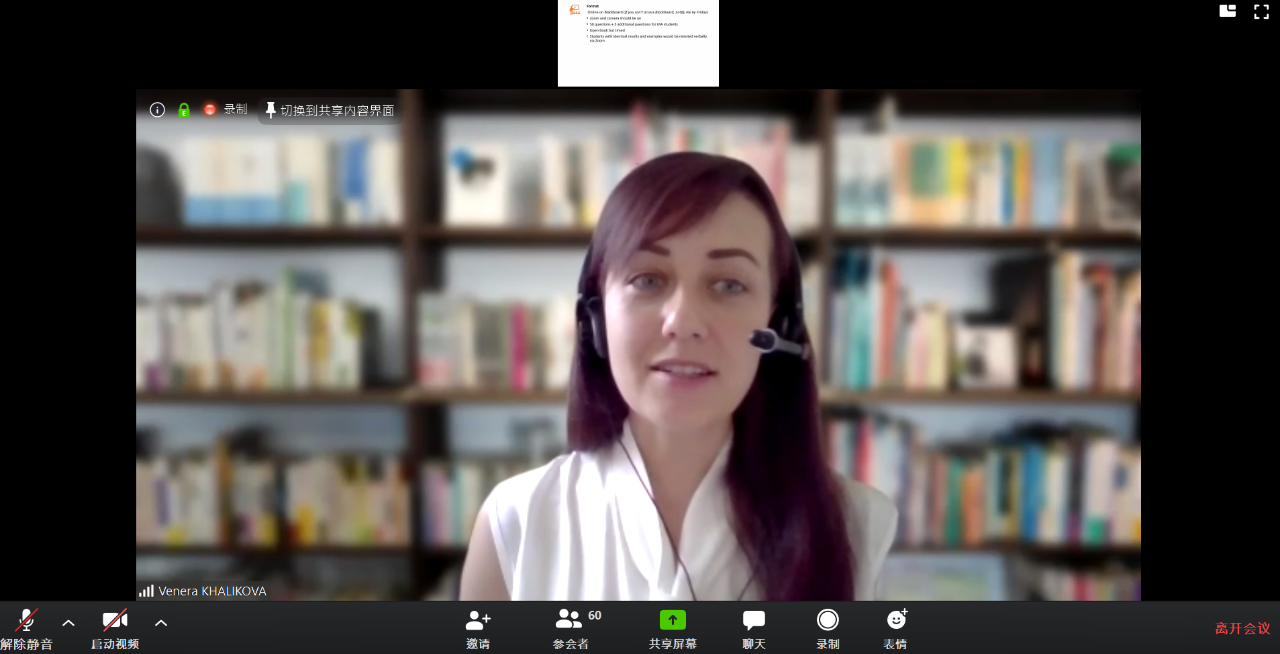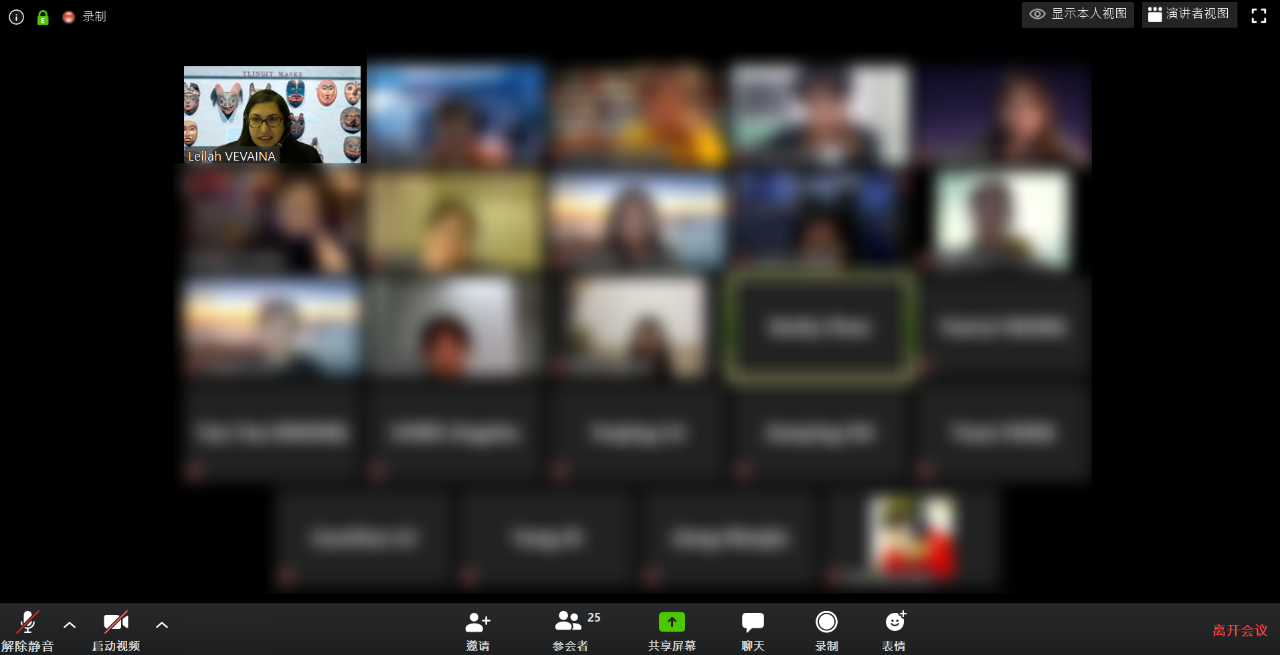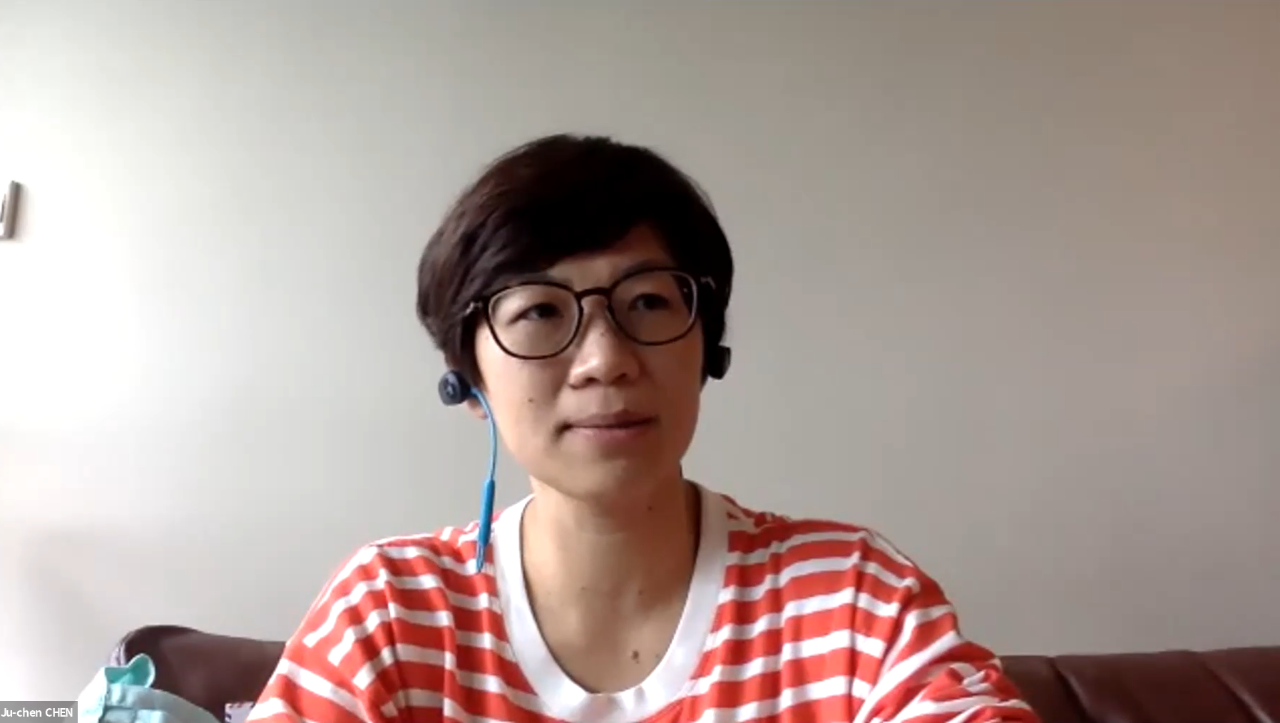2020年4月16日
Online Teaching, Questions Answered (and Asked) 線上教學,快問慢答
On 31 January 2020, The Chinese University of Hong Kong announced that online teaching will be provided starting from 17 February. From 30 January to 14 February, the University organized a series of online workshops providing trainings for teachers, students and supporting staff. On 11 February, the Department of Anthropology organized an online meeting to discuss online teaching techniques. On February 17, classes of the Department resumed online as scheduled.
Two months into online teaching, how is it going for us? We talked with some teachers in the Department of Anthropology.
2020年1月31日,香港中文大學宣布將於2月17日復課日開始,改以在線教學。1月30日至2月14日,中文大學舉辦一系列線上工作坊,為老師、同學及同事進行在線教學培訓。2月11日,人類學系的老師及同事於線上會議討論在線教學技巧。2月17日,人類學系各課程開始在線上進行。
兩個月過去,線上教學進行得如何?人類學系的幾位老師給出了他們的回答。
How long have you been teaching? Have you taught an online class before?
請問你教書多久了?之前有教過線上課程嗎?
Dr. Andrew Kipnis: My first major teaching position started in 1993. Maybe about 25 years ago, I taught something called “television university”. The lectures were pre-recorded and on TV, and afterwards I’d run a live email chat for discussion. But that wasn’t really an online class.
Dr. Leilah Vevaina: It is my first year in the Department, and before this I taught for four years as part of my graduate training. Around 10 years ago, I taught one asynchronous online class: I sent the students readings, they wrote comments and I commented on their comments. I learned a lot, but I have to say I didn’t really enjoy the experience and found it very unsatisfying.
Dr. Gordon Mathews: This is my 26th year teaching…it has been a long time! No, I haven’t.
Dr. Venera R. Khalikova: Four independent years and two years of tutorials. No.
Dr. Wengcheong Lam: I have been teaching at CUHK for 5 years. No online teaching experience before.
黃宣穎老師:教書將近四年半,沒有教過線上課程,不過參與過不少線上課程,做過一兩次直播。
陳如珍老師:我2009年開始在我們系任職。大概在1998-1999年之間,我有進行過「遠程教學」,當時是兩班在兩個不同校園的同學同時上課。

Dr. Andrew Kipnis
What did you expect before online teaching started? Any surprise?
線上教學開始之前,你的預期是怎樣的?有出乎你的意料嗎?
Andy: Well, I was really worried. I thought the students wouldn’t participate much and it would be very awkward, and it would be hard to arrange the whole thing. It has definitely worked much better than I thought it would.
Venera: I guess…I was excited? I’m a big fan of technology, and I always wanted to teach online classes.
Leilah: It was so sudden, and I was concerned about just feeling like I’m talking to the computer! But I thought, maybe it’s better than nothing, right. It turns out to be better than I thought it would be, and it has moments of being very satisfying.
Gordon: I am very pleasantly surprised by how well it works. In fact, there is pleasant-mindedness to both physical and online teaching, and you can’t automatically say the latter is inferior!
如珍:剛開始我感到很懷疑。第一次收到信說要用Zoom上課的時候,我心裡就想,「這是什麼啊……」後來學校開始做一些線上培訓,我是參加完之後才真的覺得,「噢,改觀。」負責培訓的同事的樣子很放鬆,她的展現讓我覺得,這件事是能夠做到的、讓我去想像我在她那個位置的話,應該可以的。於是我就開始去研究Zoom,整天打開來看看,覺得好像很好玩。當然也是因為沒有別的辦法,不得不做,只好接受它囉。

Dr. Venera R. Khalikova
What are some advantages of online teaching?
線上教學有哪些好處?
Venera: I actually really love Zoom. It has a lot of great functions. For example, you can record the class. For teachers, it’s a good feedback as I can see how I’m performing. For students, it’s very nice that they can replay the whole lecture when they are studying for exams.
Because I am not a Chinese speaker, it’s hard for me to remember and pronounce all the students’ names. Now, because of Zoom, I can see their names and I can address them directly. Similarly, now in tutorials students don’t have to say, “she said, he said”, which is very gendered. I am teaching a gender class, and we are trying to be gender-non-binary, and there is a student who doesn’t identify with either gender. Now people can directly refer to this student by their name.
Andy: I think the students really like to participate via the “chat” function. If you raise your hand in the classroom, it makes students feel like they’re sort of grabbing attention, but the chat function feels very relaxed for them just to put down whatever’s on their mind and it seems to be a very effective vehicle. I have particular points in the lecture when I’ll say, “okay I’m going to stop lecturing now and I’m going to go through all the questions and comments in the chat and respond to them”. It feels more interactive and dialogic that way. And, to be honest, I think currently most students are probably just stuck at home and very bored. So, they are more likely to attend classes than under most circumstances.
Gordon: I always have a problem in tutorials, when some students would never talk. Now, because I can directly see all their names and faces on the computer screen, I can easily call on them. I found out some students who didn’t talk in the physical class, are in fact quite talkative and have interesting things to say in the online class. One reason why ZOOM relatively works well is my class is unusually small this semester. Exchange students did not come due to the current situation. The small number doesn’t help us financially much, but it does make teaching a bit more intimate, so that’s another factor here.
如珍:雖然班上有七十個人,可是對每個人來講,我都像是在跟她溝通,是一對一的。例如這一堂講農民工,我會說,「今天要講民工。為什麼學中國就要講到民工,為什麼我要把這個題目放在這裡呢?感覺要跟你們交代一下。當然是因為這是我博士論文的題目啊,但是我不能直接這樣講,所以還是要解釋……」這些垃裡垃雜的。敘事的方式會變得比較personal(個人),比較不像一個public lecture(公開演講), 有點像把我的思考講出來這樣子。
做得比較好的時候,因為沒有其他的干擾——比如說,我站在那裡就像是一個老師啊,在課室裡就是面對一群人在上課——這種線上的形式,效果反而會更好。我會和學生說,你可以躺在床上、吃東西或者幹嘛,只要不睡著就行,但要把注意力放在聽覺上面。一位學生如果真的聽得很專心的話,因為其實看不到別的人,可能真的可以覺得我就是在跟她講話。
宣穎:開始線上教學之前,我錄了一個音頻給同學聽,預告說我們可能會transition(轉換)到一個更重視聽覺的階段,想讓學生在實際上進入另外一種形式之前,有機會率先體驗。
學習效果看的不是學生感覺怎麼樣,而是他們以後有沒有能夠更加人類學一些去思考。那麼,線上教學有沒有可能創造一種新的學習人類學的機會呢?我覺得是有的,這也是我錄這個音的原因:我們要把當下「線下—線上」的轉換,任何有助於促進人類學思考的東西,都作為一個契機。這是我比較想強調的。但學生不一定接收得到,或者接收得到,但是不知道自己接收到了。也許過了幾年以後,當又遇到類似的情況,他們會蠻自然地就想起這些經驗,發現能夠做一些整理或歸納,那其實就有收穫啦,只是可能沒辦法很清晰地說「這堂課讓我學到什麼」,但我相信這對於評估人類學的學習效果,是一個比較清楚的刺激跟反應。
所以我想通過這個開場白,讓學生可以去想一些事情。說老實話,到現在為止,我不是很確定學生們transition(轉換)得怎麼樣。我很希望他們能回饋給我,可是寫信給我的人蠻少的。有聽到的大部分都比較正面,可是我其實不太相信這種表面上說好的印象啦。到底是怎麼樣,我是想像說還在醞釀發酵之中。我是期待也許到之後,甚至到學期結束以後,也許會有一兩個人跟我講,也不一定。

Dr. Wengcheong Lam
What is difficult about online teaching?
線上教學的困難在於?
Wengcheong: Even though I prefer students to turn on their webcam, most of them don’t for various reasons. For instance, some of them have poor wifi–which sounds ridiculous in HK but is true when you read the newspaper. Some of them don’t have private rooms and turning on the camera will be even more distracting. I cannot even find a quiet place in my house for three hours for lectures, and I have to go to my office instead. Therefore, I don’t think it is possible to require everyone to turn on their webcam. For a big class, it will be quite hard to know the feedback since what I can see is just my screen. Also, some hands-on components, like lithic tools making technique that I am teaching this term, can not be delivered via online teaching.
Gordon: I haven’t encountered any fundamental difficulty. But, as an older professor, I need to rely on a TA’s help to manage the technical part.
Venera: I’m going to have live mid-term exams, and I’m a little worried about that. For one class, I’ll use a lock-down browser in which student can only open Blackboard. For other classes, I’m going to use Zoom and have the students turn their cameras on, so that I can see they are alone and see what they are doing. It’s still a bit tricky, but this is going to be my first experience, and I’ll learn from it.
In general, I think we’ll see this kind of online learning more and more often. If we just psychologically resist it, and keep telling ourselves that it’s hard, it’s anxious, I don’t know what to do…we’ll be stuck. I don’t want to be stuck and I want to keep trying and learning. I guess I’m the person who tries to find the good part of it.
宣穎:線上跟實體的教學,我覺得還是蠻不一樣的,可能也是因為我特別想強調不一樣吧。學校或者很多其他人,在還沒開始之前已經定調了嘛,都是想強調線上教學可以達到一樣甚至更好的效果。但我覺得有些事情,不是說它真的不類似,而是說,少數不一樣的地方,也許才是最重要的。
我覺得不一樣的地方在於,我本身講課的互動性不是非常強,到了線上,好像會進入一種開機錄影的模式,變得更容易一直講下去。似乎我今天應付的不是只有這群同學,還是一台攝影機。我現在面對這個攝影機,要讓這個狀態一直保持下去,而不是變得更放鬆、更開放、看同學的回應怎麼樣來作一種調整。再來就是學生,大部分是把攝影機關上的,你也很難知道他們的狀態是什麼。
Tutorial(導修)可能是遇到比較大困難的地方。我帶tutorial的方式一向是自由討論,我的想法是,我在講課裡面已經作了足夠的鋪陳,接下來就是你們的事。移到線上,大家會比較沉默。這可能也是線上的問題:你會變得比較難忍受沉默,或者廣義地說,比較沒有辦法忍受「不好」。如果是在教室裡,我可能會讓同學沉默多一點,大家可以互相看一看,可能會有一些眼神,有些人不好意思會笑,會有一些這樣的有趣的眼神或者肢體動作。你可以讓這個團體的情緒跑一陣子,也許就會有人講話了。但是線上就可能不會這樣子,失去了那種注視的時刻的感覺。比如在教室裡,有些人你一旦看他,他就會舉手說要講,有些人一旦被看就會低頭,有些人一旦被看就會轉頭去看別人,哈哈。那這個東西在線上就沒辦法看到,當然也會看到有些人低頭啦。
如珍:我之前蠻認真地準備了怎麼樣用Zoom上課,比準備要教什麼更多。可是上完第一堂課呢,我有點氣餒。
一是覺得時間掌握得不好,一直不停地在弄電腦,一下看這個、一下切換那個,Zoom的時間過得比較快。
第二是,因為學生都不開攝像頭,只會說話或者打字,所以如果有很多不是文字的信息沒有抓到,跟學生的互動就會沒有很好。他們在說話的時候有停頓或者語氣怎樣,可能不是conscious level(意識層面)的,可是如果在心裡處理了這些資訊,我會覺得跟她的互動就沒有那麼模糊。所以我意識到,要把聽覺方面的注意力開得非常大,跟學生互動的隔閡感覺就會減少。
第三點是,我剛上完課就立刻有兩個學生寫email(電子郵件)給我,而且是一下課就寫哦。他們建議我不要一直問問題。我上課本來就喜歡跟學生有互動,我喜歡Zoom也是因為互動是可能的,所以我有一直停下來問他們問題,請他們打在chatroom(聊天室)裡告訴我呀,或者用投票的功能,或者開白板讓他們寫字。然後這兩位同學就說,可不可以不要一直討論。
因為他們的反饋,我就明白,線上教學的時候,學生對效率的期望有提高。他們不是要來聽笑話、不是要來看同學,也不是只是坐在那裡想他自己的事情。學生很想要你全部都講完,然後有問題的人再去問就好了。如果她覺得無聊的話,就會很想走掉,因為這裡不是教室。我猜可能他們的媽媽就在旁邊啊、或者很吵、或者網路不是很穩定,如果學生不能很清楚地知道你在教什麼的話,我感覺到,他們的焦慮程度會更高。

Dr. Leilah Vevaina
What methods do you use to attract students’ attention and improve your class?
你用了哪些方法來維持學生的注意力,提升課堂質素?
Leilah: I was worried about the graduate course on anthropology theory, because it is so long, three hours. That’s why I got a suggestion from a colleague in another department, and decided to do it like this: First I send students my PowerPoint slides with a 1-hour long audio over it before class, so they can listen to it for the lecture part. Then, I split the class into three groups, and we do discussion during class time in a seminar style. In between, students can send me emails with questions.
I have to say my prep time for the theory course has gone up a lot, as I need to do the recording and I find students podcasts, videos and interviews, all kinds of additional materials. But I just feel like, you know, especially for the MA students, they only have this one year and it’s already been so disrupted. So, I was like “I’ll just try really hard and hopefully get something good out of it.” I feel like I am putting in a lot of effort, and I appreciate that the outcome is sort of matching. I think it’s working, and I’ll see what the students feel and adjust.
Gordon: I insist that everybody turn on the camera and show their faces. Maybe this is more psychological, but I want to see the face, so that I can know that we are having a human interaction. Maybe they are using Facebook and it also looks like they are staring at the screen. Anyway, students are paying attention because they know there’s a pretty good chance that they’ll get called on!
Wengcheong: I integrate different interaction components (chat room/uReply/breakout room) in lectures. But I think when it changes to online teaching/e-learning, it‘s basically up to the students to decide whether they want to learn. Pessimistically, what we can do to keep students’ attention is very limited. However, it may not be a bad thing in the long term. My philosophy is that students should be encouraged to do whatever they want to do, and they need to learn how to balance different opportunity-costs. If they think watching a movie is more important, and if they are smart enough to figure out the teaching contents by using a 2x speed to watch the recorded lecture, then perhaps there are very limited things that we can do to keep students there.
如珍:收到學生的反饋之後,我就跟他們說,我會盡量把課分成一段一段的,但是不會沒有互動,因為我覺得上課時學生的思考是最重要的。他們也都接受。因為我第二天也會上一樣內容的課嘛,我上完之後就覺得成功了。
我有改變的是要有清楚的段落感,以及用一種一邊思考、一邊說故事,有點像是聲音的表演的方式來敘事。我覺得是有差別的耶,即使隔著熒幕,也可以感覺得到。有一次我用了十幾分鐘講我的一位informant(報導人)的一個故事,最後再解釋為什麼我要講這麼久。我一個人,對著電腦一直講,學生完全是沉默的,我根本沒有任何反饋的線索。可是講完以後,我有感覺到自己說得很清楚。下課之後,有一些同學來問問題。通常學生比較少會一邊思考一邊問問題,一般都是有一個很具體的疑問。但是那天,就有些學生一直說,「嗯,怎麼講」、「我要想一想」之類的,有進入一種有在想的狀態,才來問我,所以我覺得,這段敘述應該是有達到某一個效果。
我原來上課都會留出improvise(即興)的空間,現在我發現,線上教學很吃備課,要備得很完整。我原本也很堅持不給同學投影片,但現在我都會先給,還會給一個上課的大綱,解釋閱讀材料,列出那堂課會講的幾個問題,來降低同學們的焦慮。我希望他們來上課的時候已經大約知道這堂課會是什麼,那上課的時候我就比較沒有壓力,可以比較專注在我的narration(敘事).

黃宣穎老师
Is there one big thing that cannot be replaced by online teaching?
你覺得平常的教學當中,有什麼是線上教學所不能取代的嗎?
宣穎:我覺得對於線上教學,我們不能夠這麼快地去強調說它效果很好。這是一個defense(辯護), 也是一個denial(否認).應該要慢慢地去聽,對方到底想說什麼。我相信很多事情是很難說出來的,所以更加不應該很快地堵住他們。
有些人想來香港唸書,其實是帶著一些夢想、期待。來到這裡之後,遇到了這麼多困難的情況。講得有點interpersonal(人際)的話,就是要去看學生跟學校的關係是什麼,怎樣跟學校有一些attachment(依附),然後學校現在說,「其實我們只要透過電腦聯絡就好了」這樣子。要做類比的話,也許會是「分離」或者「拋棄」,這個東西可能很深遠。比如說,從小到大,原本以為媽媽會永遠陪在你身邊,後來媽媽跟你說,你已經三個月大了,我要上班了,就把你丟給托兒所。拋棄跟分離其實永遠是人類原始的困難之一,會勾連出很多相關的回憶或情緒,可以發酵很久。如果我們這麼快就只關注在技術層面,說「沒有問題呀我們每個人都可以下載一個Zoom而且每個人都會用」,這樣的話,背後的東西可能很久都沒辦法處理。
Wengcheong: Definitely the face-to-face interaction and the atmosphere in that setting.
Andy: For the MA students, at least those who come from mainland China and other places to Hong Kong, I think part of what they want to pursue is a more personal relationship with the professors, and that’s sort of shut off for them. I also think that they miss the opportunity to bond in person with their classmates.
Leilah: Like 1000%! I cannot even stress it enough. Even small things like talking to your friends when you walk into the classroom or talking to the professor and all of that interaction, those are really amazing things. And it makes people feel like they’re part of a group. I feel that is really missing, like literally with the social distancing. I know we’re all supposed to do this. It’s for our own health and safety. But I really, I really, really miss that, even just like seeing a colleague in the hallway. And I’m sure the students miss it amongst each other too. A lot of people are like, “oh, is this going to be how it’s always going to be? Are we all going to switch to online?” And I don’t think so. I mean, maybe this is because how much social theory I’m reading, but we are social animals, and we want to be with each other. There is something about this.
Venera: Let me tell you something. I used to be very conservative and felt that only real, physical universities and face-to-face interaction with a professor could be beneficial, could be productive.
But I’ve been living outside Russia for more than ten years now. I know that I talk to my parents, my sister and a lot of friends who are in Russia online, and I know that intimacy and friendship and meaningful connection can also be done online. I feel that a lot of transnational migrants have that. They really realize that technology can accomplish a lot of things. Because of my personal experience, now I feel technology can also be very useful for teaching.
Of course, it’s nice to be sitting next to someone. And I believe it’s a little easier for me to teach this semester because I met my students for three weeks before lunar new year, so I kind of know them a little bit. It’s the same for my family and friends, I know them. I think being present in the same space is foundational in some sense, and you do need some balance. But technology is still doing its amazing job! If technology didn’t exist, now we would be totally devastated. I feel that we are extremely lucky and blessed with all these technologies. That’s why I feel optimistic.

陳如珍老師
Is there any interesting thing that you can share with us?
有沒有什麼有趣的事情可以和大家分享呢?
如珍:最難的部分是,講笑話的時候不會聽到笑聲,因為大家都關麥克風。我想象他們有笑,但那一剎那的感觸是很清楚的。平常上課你講笑話大家是會笑的——講課不一定有人聽,講笑話是一定會笑的。Zoom講笑話的時候,習慣性期待大家會笑,可是都沒有。感覺我是在跟我的電腦說話。
可是,其實學生比平時上課更不吝於給你反饋。如果我說,「到底有沒有人在聽啊,好懷疑哦」,就會有人給我拍拍手或者大拇指或者在chat room(聊天室)裡面說「有」,而且會很多,可能一次出來三十個這樣。
可是你要去問。我覺得你要想象技術是你感官的延伸,要跟電腦變成一體。你想知道的時候你就問,就會有很積極大量的feedback(反饋)。像下課的時候同學都會說「謝謝你」、「很有趣」、「學到好多唷」,這些反饋是以前不會有的。
我感覺自己跟科技的關係改變了。原來可能會覺得,我用電腦就是打字比較快,用email(電子郵件)就是不用去寄信,就只是一個工具而已。現在我比較覺得它不是一個外在的東西,比較接受它變成我的世界或者說我的感官的一部分。
這個我想可能有世代差異。我們系的老師不是有在學校的培訓之後,開會討論線上教學嗎,在那之後我有跟Venera再用Zoom討論了幾次。我們兩個都很興奮,她是對技術很感興趣,我也在想教學到底是怎麼一回事。我猜老師是不同世代的人,線上教學的課也會不太一樣。
Gordon: During a tutorial, a female student’s boyfriend came in and started talking with the student. This guy walked in while the whole class was watching, and they were actually having a slight argument there, which was quite funny. I usually don’t know how my students live their life, so there’s some personal interaction here.
Andy: I think the funniest thing has probably been me. Maybe I’m funny to my students—at the start of the lecture when I’m trying to figure out how to get everything adjusted on the screen, I go, “oh wait a second”, “Oh, let me start this all over”…
宣穎:線上教學有一種不太一樣的放送感。當然也跟我拿了一支麥克風有關係,而且我可以從一個觀眾的角度來看到自己,好像在一個舞台上面的感覺。我又可以控制我的畫面,總是可以把兩幅畫放進來,一邊還有一個有點像沙發的椅子,這個經驗還是蠻有趣的。

Dr. Gordon Mathews
Do you think we should/can incorporate some elements of online teaching into our routine? Why or why not?
你認為我們在日常的教學中,應該/能夠引入線上教學的元素嗎?為什麼?
Gordon: I might be willing to go so far as to make all my tutorials on ZOOM. Tutorials do seem to work better using ZOOM because everybody has to talk, particularly MA tutorials. But I might not. What I am going to do is to ask students to really evaluate this in this year’s course evaluation. It depends on what students think.
Andy: I think I’m going to figure out more about that how students can just type in questions on their phone or their laptop while they’re listening to a lecture and then somehow I can see them on a screen.
Venera: I think the best approach is a hybrid approach, both on-line and off-line, and all of us are doing it anyway. Even answering emails is a form of online teaching. It’s not like it’s something new. Zoom for me is just another great tool to use, a natural continuation of our hybrid teaching. That’s why I didn’t feel anxious or worry about it.
Having said that, I’m probably the youngest full-time teacher in the Department. I have this advantage of age and I’m more comfortable with technology. I’m sure everybody has their different style, and I’m really grateful for having this opportunity to experiment with different technologies.
Leilah: I’ve been talking to a lot of friends who are now suddenly teaching online in the US, and resources can be very, very uneven. One of them teaches at a college in a kind of poor area, and she said only 20% of her students have their own computer. And another friend of mine who lives in Australia was saying that they have terrible internet connection, and that actually would be a big problem. Such situations really expose all those inequalities and infrastructure issues that we don’t usually think about, but really need to be realized and discussed.
宣穎:我在剛剛提到的錄音裡,談了setting(設定)這個概念。這是我比較熟悉的、心理治療喜歡用的一個概念,意思是我們做任何事情都會有一套規範,一個必要的條件。移動到線上不完全是壞事,因為相對來說比較不需要花錢,就可以把setting打造成一個你想要的樣子,也不一定。
我覺得setting提供了一個很好的想法來讓大家思考一些相關的事情,比如說什麼是相處在一起,什麼是「在(being-there)」。同時,我也是想表達說,作為老師,我當然有責任去維護和重新建構一個理想而且能夠與之前的狀況有延續的setting, 但線上教學的話,其實setting的責任很大一部分會落在對方身上,同學們自己在家裡,也會給自己打造一個學習的環境。所以你其實也是你自己的host(主持),你有沒有意識到你現在多了一些責任呢,有沒有要怎樣去打造你的環境呢?
但是我後來想想,很多學生住的地方,可能沒有辦法去打造一個很好的環境,如果我太強調這一點的話,也許對於一部分學生來講,會覺得不太好意思。可能因為我最近剛好換了一個比較好的辦公室,好像終於有一個可以自己去打造的空間,於是也變得有一點要去push(促使)學生也去打造一個比較好的環境。後來想一想,很多學生可能沒有這個條件。
The transitioning to online teaching is a coping method that we adopt when there is little choice, but it also provides new opportunities for exploration and experiment. In face of the current pandemic, at a time of danger, uncertainty and anxieties, to attend a class may not be the most pressing thing to do. Yet, to learn and to reflect may always be essential for human beings, as a species and as a community.
The University’s motivation to ensure that teaching activities continue and the quality of teaching is upheld may not be dissimilar to people’s pressure and measures to maintain the order of everyday life at the current moment. Whether the continuous operation of social mechanisms is to escape the current crisis and consolidate the existing structure, or to support each other and explore the future with prudence, humility and more openness, however, is a question for every one of us.
轉為線上教學,對於學系老師與同仁來說,是倉促卻不得不作出的應對,亦是能夠去探索和嘗試的挑戰。疫情當前,在種種充滿不確定的憂慮當中,課堂上的教學,可能不是最緊迫的事。然而,教與學、思考與互動,對於人類這一物種與社群來說,或許永遠都是必需且重要的。
校方確保教學活動繼續進行、保持教學質素的動因,和人們在當下維持生活秩序的壓力與努力,也許不無相似。而社會機制的持續運轉,是為了逃避現時的危機、鞏固原有的結構,抑或在彼此支援之中,謹慎、謙虛亦更開放地探索未來,是擺在每個人面前的問題。

